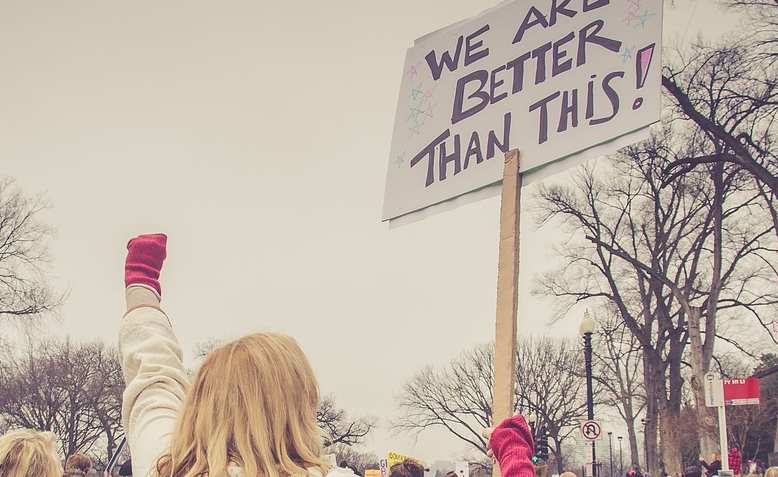 Women's rights protest, Photo: Pixabay / Public Domain
Women's rights protest, Photo: Pixabay / Public Domain
Lindsey German argues that women and sex inequality should be at the centre of our analysis of social transformation.
When the lockdown began back in March, many women suddenly found working from home to be a challenge but also, in a paradoxical sense, a relief from the normal routine. While there was the extra work involved in homeschooling children, ensuring food supplies, caring for relatives and neighbours, there was also more time with children, freedom from long and challenging commutes and a release from the morning and evening rush of school, childcare and work.
Lots of people talked about not going back to the old normal – but rather changing the patterns of work and leisure, home and family life on a more permanent basis. Yet as the months have progressed, two things have become clear: that the ‘new normal’ involves attempts to return as much as possible to the types and levels of work that existed before the coronavirus crisis; and that women are expected to juggle all their work and caring responsibilities in order to achieve this.
Women have, as is clear from a whole number of surveys, borne the brunt of work around the home during the lockdown. They have also been major players in frontline work as nurses, carers, teachers, shop workers and cleaners, and have still had to carry out many family responsibilities in addition.
Events during 2020 have changed the lives of millions of people, and the future is more uncertain for many of us than at any time since the Second World War. The crisis has given us the chance to reimagine work, leisure, family – but there are lots of constraints on this, most obviously the determination of government and many employers to insist on a physical return to work and education. This is foolish in the short term in that it is driving an increase in Covid-19 infections, but it also betrays a lack of imagination and forward thinking about how we could live our lives in the 21st century.
The present economic model of work makes no sense for any rational society. The ‘male breadwinner family’ where the woman stays at home or works part time to look after children and housework has long gone, replaced with women and men both tending to be active in the labour market on a full-time basis. Their two salaries become increasingly necessary to fund housing and other essential costs but also to pay to work. Costs of commuting, childcare, clothing for work, food and drink while at work, are high. One estimate showed that even relatively low earners in the City of London spent around £100 a week on these expenses.
How much of our spending revolves around work is illustrated by the fact that some of the most badly affected areas of the economy include retail clothing, food outlets in city centres, public transport and the pub and restaurant trade. The argument that we need to work from offices rather than from home in order to sustain these industries is a through the looking glass view of the world.
There is no need for most of us to work so long or so intensely. A four-day week without loss of pay, a mix of office and homeworking where necessary, an earlier retirement age with increased pensions so that older people no longer have to work in paid employment, are all simple measures which would make a major difference to women and to families as a whole. They would improve health and wellbeing, and – given the technological advances of this century – would not lead to a loss of productivity.
But they would have to be accompanied by a fundamental change in how women’s work is valued. The lowest-paid occupations in Britain correlate with those that are the most female-dominated. Caring work and cleaning are often, in reality, paid below minimum wage. A major part of the problem of low pay for women’s work is that so much of this work is carried out for free and is therefore valued little in a capitalist society.
Yet these jobs were shown to be essential and valuable during the lockdown. They need to be secure, well paid, permanent jobs which can include much of the work now done unpaid in the home.
There was nothing normal about the old normal. It was a model of work which put huge strains on all members of the family, led to stress and anxiety, and to work for the sake of it. This period should give us a chance to look at the narrow, work-driven, competitive society that we have created and argue that we need something more sustainable, where work enables us to contribute to society while also having the time and space for leisure and loved ones.
Existing society is also based on the systematic oppression of women, one which leaves them bearing the load of domestic labour as well as discriminated against in work outside the home. This inequality has been revealed very starkly by the coronavirus crisis. Women provide childcare and domestic labour free of charge. When we consider how working outside the home might change as a result of the crisis, we cannot ignore how central that unpaid labour is to the economy and society, and what great injustice this creates.
Before you go
Counterfire is growing faster than ever before
We need to raise £20,000 as we are having to expand operations. We are moving to a bigger, better central office, upping our print run and distribution, buying a new printer, new computers and employing more staff.

